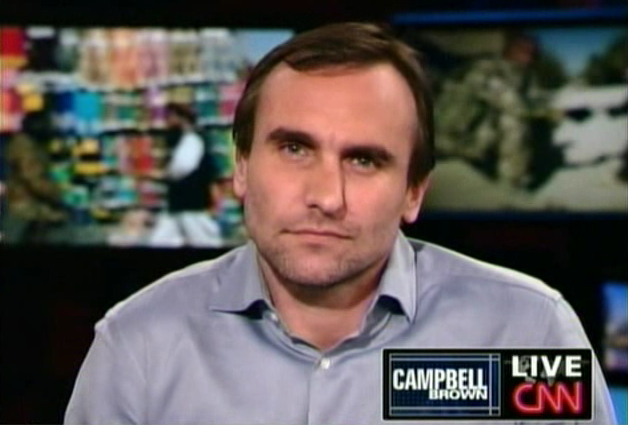CB: "There's any number of wars currently under way in Afghanistan and Pakistan..."
Wednesday, October 28, 2009

Length: 4:43
LARGE (54.7 MB) ----- SMALL (5.9 MB)
Campbell Brown talks to Michael about the latest bombings in Afghanistan and Pakistan.
CAMPBELL BROWN: In just a little bit, Secretary of State Hillary Clinton begins the second day of her trip to Pakistan. Her arrival today was followed by a massive car bombing in a city about two hours away.
Pakistani TV ran pictures of the attack at the same time that Clinton was speaking. The explosion, which killed at least 100 people, is believed to be the work of the Taliban. A Taliban attack today in Afghanistan as well claimed 11 lives, including five U.N. workers.
We have CNN's Michael Ware with us right now. We want to bring him in.
Michael, so, give us your take on what happened today. Was this a message to Hillary Clinton? What were the terrorists trying to accomplish here?
MICHAEL WARE, CNN CORRESPONDENT: Oh, I think -- I don't think the timing was by coincidence. It certainly makes it much more poignant to slaughter more than 100 innocent civilians on the day that the U.S. secretary of state is in country.
And just that visual image that you showed from Pakistani TV, that juxtaposition of the secretary of state and the slaughter on the same screen, achieves the Taliban's end. But there's something very, very important Americans need to bear in mind here, Campbell.
We mentioned two attacks, one in Kabul that killed at least five U.N. workers today, and the attack in Pakistan in Peshawar, which is on the edge of Afghanistan, on the Pakistani border, inside Pakistan, that killed more than 100. Now, these were carried out by Taliban, both attacks, but two different kinds of Taliban.
One was carried out by the Pakistani Taliban, almost certainly, the other one most certainly by the Afghan Taliban. I mean, there's any number of wars currently under way in Afghanistan and Pakistan where U.S. troops are based in that theater.
There's currently a war against the Pakistani Taliban being fought by the Pakistani military, which is most likely the trigger for this devastating car bomb in the marketplace in Pakistan that killed over 100. Meanwhile, you have got the U.S. war and NATO in Afghanistan. There, we see five U.N. workers slaughtered in their guesthouse in the capital, Kabul. That's most likely the work of the Afghan Taliban.
So, there's any number of wars that America finds itself involved with or tangentially associated with in that region. It's very complicated, Campbell.
BROWN: Well, to that point, Michael, as the president tries to decide what this new strategy is going to be in Afghanistan, it's clear or seemingly clear that the two countries are inextricably linked, and we have to think about that in deciding how to go forward.
WARE: Absolutely. There's absolutely no question about that, either at the military or policy-maker level.
If you remember, when Ambassador Holbrooke was named as the president's envoy for that region, I mean, it included Afghanistan and Pakistan. And to a degree, it also includes India, whether you like it or not, because that's the environment U.S. troops find themselves fighting in.
Afghanistan is a battlefield for influence between all the regional players, from Pakistan, to India, to China, to Iran. So, I mean, it's a very layered situation. And, as we all know, there's Pakistani Taliban, and then there's Afghan Taliban, both of whom are in Pakistan for two very different reasons.
And, as I said, it makes for a number of different wars that America has to be involved with, one way or another, whether you would like it or not -- Campbell.
BROWN: And, then, Michael, just focusing on Pakistan, on the plane ride over, Secretary of State Clinton told reporters how important it is to her to try to strengthen our relationship with Pakistan. I mean, can Pakistan be trusted right now as a reliable ally in all of this?
WARE: Well, that's also what Pakistan asks about America.
Now, let's not forget, Pakistan is looking after Pakistan. America is looking after America. And no one deludes themselves about that. Now, when the time comes that America's and Pakistan's interests collide, as they did so almost seamlessly during the Russian occupation of Afghanistan in the 1980s, it suited America and Pakistan to work together.
Today, it suits each side to work together on a level and it doesn't suit each other on another level, so, again, adding to further complication, Campbell.
BROWN: Michael Ware for us tonight -- Michael, as always, thank you.
WARE: Thank you.
